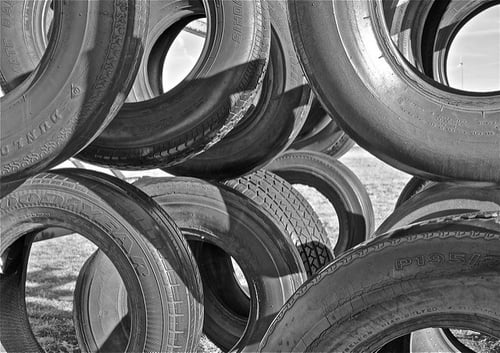Hello, darlings!
Well, to say the last month has been a rollercoaster ride is an understatement! The weather can't seem to make up its mind about what season it is. Eating outside in the garden is just as likely to end in everyone getting drenched as being the lovely experience it should be at this time of the year.
One thing never changes, however, and that is the fact that, rain or shine, I'll be here every week to discuss everything relating to owner driver jobs in the field of courier delivery work.
This week is no different and, since you lot took to my more serious posts so well last time, I've decided to keep going down that route. So I grabbed my resident in-house specialist (Stevie, of course) and dived headfirst into the world of tyres. It's all for a good cause though: so I could write a blog about why it is important to keep your tyres well cared for when you're an owner driver. The result, as you may have guessed, is what you're reading right now – and the lines below are my attempts to translate all the industry jargon into layman's terms, and explain why tyre maintenance is crucial.
Keeping Your Rubber Right on the Roads
So, why is it so important? I expect many of you already know – but if you don't, you really should. Quite simply, tyres wear out fairly quickly. The more worn out they get, the less safe they are and the more the car tends to skid. The more the car skids (or the less grip it has) the higher the chance of accidents occurring. And, at the end of the day, nobody wants accidents, do they?
That's why I've decided to share a few tips on how to make sure your tyres are always safe. So here they come.
Top Tips for Tyre Safety
You should replace your tyres periodically so they don't become too old or worn out (ideally every 6,000 to 8,000 miles, or every five years, according to Stevie) and check the pressure on a monthly basis or even more often. It's also important to check to make sure they don't get any irregularities or worn-out areas. If they do, you should get your wheel alignment checked immediately.
It's also important to pick the right type of tyre, as they're not all the same, even if they fit the same type of vehicle. For example, certain types of tyres are designed to sustain heavier loads than others, and some are even made especially for camper vans (for example) – so, obviously, you don't want to use these for your commercial delivery vehicle. Ultimately, it's up to every owner driver to figure out which type of tyre suits him or her best; but it's always important to remember not to just buy the first or cheapest one you see, as that might end up costing you in the long run.
As I said, most of you will know this – you're all hardworking owner drivers and I'm just a woman who writes about it! But for the newbies, I hope this has been helpful to you.
Until next time...
Ta-ra!
- Gertie
x



















